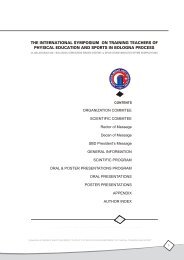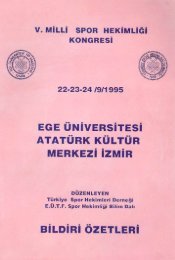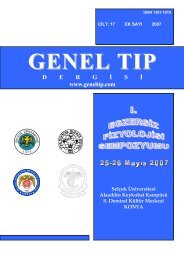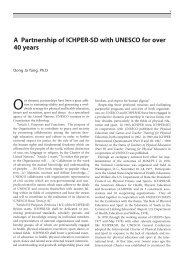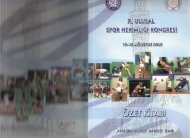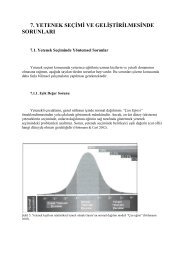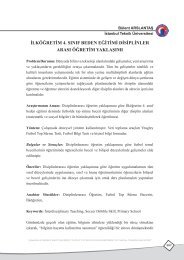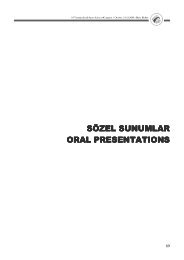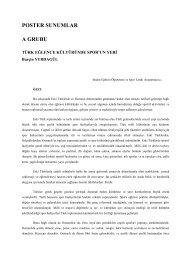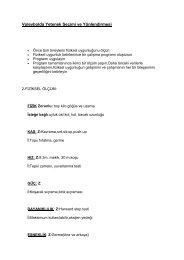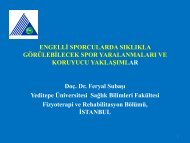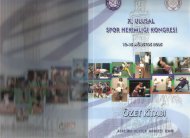KARDÄ°YORESPÄ°RATUVAR EGZERSÄ°Z TESTLERÄ° ... - Spor Bilim
KARDÄ°YORESPÄ°RATUVAR EGZERSÄ°Z TESTLERÄ° ... - Spor Bilim
KARDÄ°YORESPÄ°RATUVAR EGZERSÄ°Z TESTLERÄ° ... - Spor Bilim
You also want an ePaper? Increase the reach of your titles
YUMPU automatically turns print PDFs into web optimized ePapers that Google loves.
7.ULUSLARARASI SPOR BİLİMLERİ KONGRESİ27-29 EKİM 2002KONGRE - PANELLER4. Coping with jet-lagThere have been very many remedies suggested for alleviating or eliminating jet-lag. Some of thesehave had little substantial rationale, others have had theoretical backing but limited empirical evidence. Onlythe major approaches are mentioned here.4.1 Pre-flight adjustmentIt is thought that adjustment of the body clock prior to a long journey should eliminate jet-lag after theflight. This adjustment is attempted by altering the timing of sleep and activity, delaying bed-time before awestward flight and retiring early before an eastward flight. Reilly and Maskell (1989) examined theconsequences of phase delays and phase advances of 3 h, 4 h and 5 h. They reported it was not useful to tryto adjust fully to a time-zone transition prior to the journey since this intervention interrupts lifestyle and trainingtoo much and has only minor effects on adjusting the body clock. Only the sleep-wake (rather than the lightdark)cycle is manipulated and many travellers will not have opportunity even to do this. A benefit of a minoradjustment is that it can begin to shift the body clock in the desired direction, in the event of a long-haul flightcrossing 9 or more time-zones to the east.4.2 Timing and composition of mealsIt has been suggested that high-protein breakfasts promote alertness and that high-carbohydrate eveningmeals (vegetables, potatoes, rice, bread, pasta, desserts, etc.) promote sleep (Graeber et al., 1981). Thetheoretical grounds for this include the effects upon plasma amino acids that such meals would have and ,thence, the uptake of the amino acids into the brain, their incorporation into neurotransmitters, and the releaseof the neurotransmitters. High protein meals (meat, cheese, eggs, etc.) undoubtedly raise plasma tyrosine, butwhether this promotes the release of catecholamines by the activating systems of the brain and so promotesalertness, is less clear. Similarly, high-carbohydrate meals elevate the concentration of plasma tryptophan, butwhether this stimulates the raphé nucleus and sleep is also uncertain (Leathwood, 1989).Electroencephalographic waves have shown some changes in athletes on a carbohydrate rich diet, but effectson the quality of sleep have not been demonstrated. The two-phase dietary method was promoted in the USAunder the title ‗President Reagan‘s Anti-jet-lag-Diet‘ (Ehret and Scanlon, 1983).Scientific tests of the efficacy of the diet are few and poorly designed. Even so, a variant of this proposalhas been marketed. It consists of two types of pills, one to be taken in the morning and the other in the evening.Each pill is a mixture of substances, the morning pill containing tyrosine and the evening one, tryptophan. Theaccompanying literature does not enable a judgement to be made on the scientific evaluation of thesepreparations. Besides, tryptophan achieved adverse publicity in the early 1990s owing to the finding ofimpurities in commercially available products and its use is no longer recommended.4.3 Sleeping pillsDisturbance of sleep is one of the unwanted corollaries of jet-lag syndrome. Resynchronising the normalsleep-wakefulness cycle seems to occur first, prior to restoration of physiological and performance measures totheir normal circadian rhythm.Although drugs, such as benzodiazepines, are effective in getting people to sleep, they do not guaranteea prolonged period asleep. Besides, they have not been satisfactorily tested for subsequent residual effects onmotor performance, such as sports skills. They may be counter-productive if given at the incorrect time. Aprolonged sleep at the time an individual feels drowsy (presumably when he or she would have been asleep inthe time-zone departed from) simply anchors the rhythms at their former phases and so operates againstadjustment to the new time-zone.The administration of one benzodiazepine (temazepam) was found to have no influence on subjective,physiological and performance measures following a westward flight across five time zones. The circadianrhythms of athletes differed from those of sedentary subjects, although neither group benefited from the349



